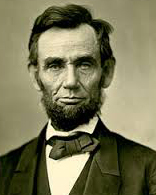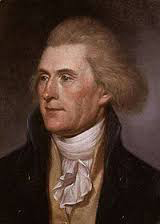
The first one used just over 1,400 words to do it. That was George Washington. The most recent one, Barack Obama, took about 2,400 words. The one who took the longest to do it, with over 8,000 words, was William Henry Harrison in 1841. The first one to do it in the third week of January, did so in 1937, setting the precedent for every inauguration to follow; and that was Franklin Delano Roosevelt. And the president-elect who spoke the fewest words at his inauguration, Abraham Lincoln, chose among the most eloquent 700 words to do it.
“With malice toward none, with charity for all,” Lincoln said in his second inaugural address, “let us strive on to finish the work we are in…”
On that day, March 4, 1865, the American Civil War was still not officially over. Indeed, the actual surrender at the Appomattox Court House by General Robert E. Lee to General Ulysses S. Grant was still another month away. And yet Lincoln beseeched his country, “to bind up the nation’s wounds, to care for him who shall have borne the battle and for his widow and his orphan, to do all which may achieve and cherish a just and lasting peace among ourselves and with all nations.”
Ironically, according to Robert Schlesinger, opinion editor at the U.S. News, Lincoln then wrote that he hoped the speech would “wear as well – perhaps better than – anything I have produced.” Most observers view the 16th president’s inaugural address on that day – just five weeks before he was assassinated – as the greatest in U.S. history.
And if Lincoln’s “let us strive” address weren’t enough to motivate Donald Trump, who will ascend the podium on Capitol Hill in Washington, D.C., tomorrow, and repeat the words, “I do solemnly swear that I will faithfully execute the Office of President of the United States…” he would be wise to consider a few others.

Some speeches proved indelible by accident; others by design. Some rang like clarion calls; others revealed the American soul when it most needed prodding or soothing. When Thomas Jefferson was elected in 1800, and the party occupying the White House shifted for the first time, Jefferson’s rivals feared he might send the Republic into a French-Revolution-type reign of terror.
“The sacred principle (of majority rule,)” Jefferson reassured Americans, “must (let) the minority possess their equal rights, which equal law must protect, and to violate would be oppression.”
In 1937, in a winter storm, re-elected Franklin Roosevelt took the Oath of Office as thousands watched in the wind and sleet; he wiped the rain from his eyes noting, “If they can take it, I can take it.” His speech had to blame the greed that had sparked the Great Depression. It had to recognize the plight of common Americans while buttressing the measures he’d introduced in the New Deal. Above all it had to be a call to action and a plea to find the balance of wealth.
“The test of our progress is not whether we add more to the abundance of those who have much,” Roosevelt said. “It is whether we provide enough for those who have too little.”
In a column, U.S. News’ opinion writer Schlesinger also warned that presidential inaugural addresses often tend not to “linger in the public’s memory.” He explained that Ted Sorensen, preparing notes for president-elect John F. Kennedy’s inaugural address in January 1961, called past addresses “a largely undistinguished lot.” He encouraged JFK to make it short. It was fewer than 1,400 words. Historians said his speech was like Churchillian oratory, and a benchmark against which future addresses would all be measured.
“Ask not what your country can do for you,” Kennedy entreated on Jan. 20, 1961. “Ask what you can do for your country.”
One hopes that president-elect Donald Trump has chosen to do some reading, as opposed to tweeting, to prepare for tomorrow. One hopes he has chosen thoughts more inspiring than, “My fingers are long and beautiful, as … are various other parts of my body,” or, “It’s freezing in New York. We need global warming,” or, “The beauty of me is that I’m very rich.”
President-elect Trump may detest the president he’s succeeding, but he’d be wise to recognize the man’s sense of the moment and eloquence on a podium. When he was re-elected in 2012, President Barrack Obama needed to extend his fight against poverty, prejudice, climate change and inequality for people espousing a gay lifestyle. It’s arguable whether either he succeeded, but the content of his address caught his people’s imagination.
“America’s possibilities are limitless,” President Obama said in 2013. “We are made for this moment, and we will seize it so long as we seize it together.”
Tomorrow is Donald Trump’s turn. For the sake of his fellow citizens and citizens of the world, we hope he has given his inaugural address more forethought than a 140-character tweet.
Hello Ted I have a query……by the way I am enjoying the great escape which brings me to my query……both Tommy Thompson and Phil Marchildon were in stalag 3….my understanding both did the death march from sagan…..do you have any supporting info regarding such……….in addition Red Hyde who resides in Penetang [recently passed away] was also on the march……what is unique Phil and AB Thompson were in school together both played on the same rugby team…..thanks Waxy
Mr. Barris,
I understand you will be the guest speaker at the Federal Retirees luncheon later this month in St.Catharines. I have actually visited Stalag3 and will bring some pictures. I am sure you have them all but I have those on a stick for you to copy should you wish to do so. I would be interested in buying a book over the Great Escape, hopefully with autograph.
Thank you,
F